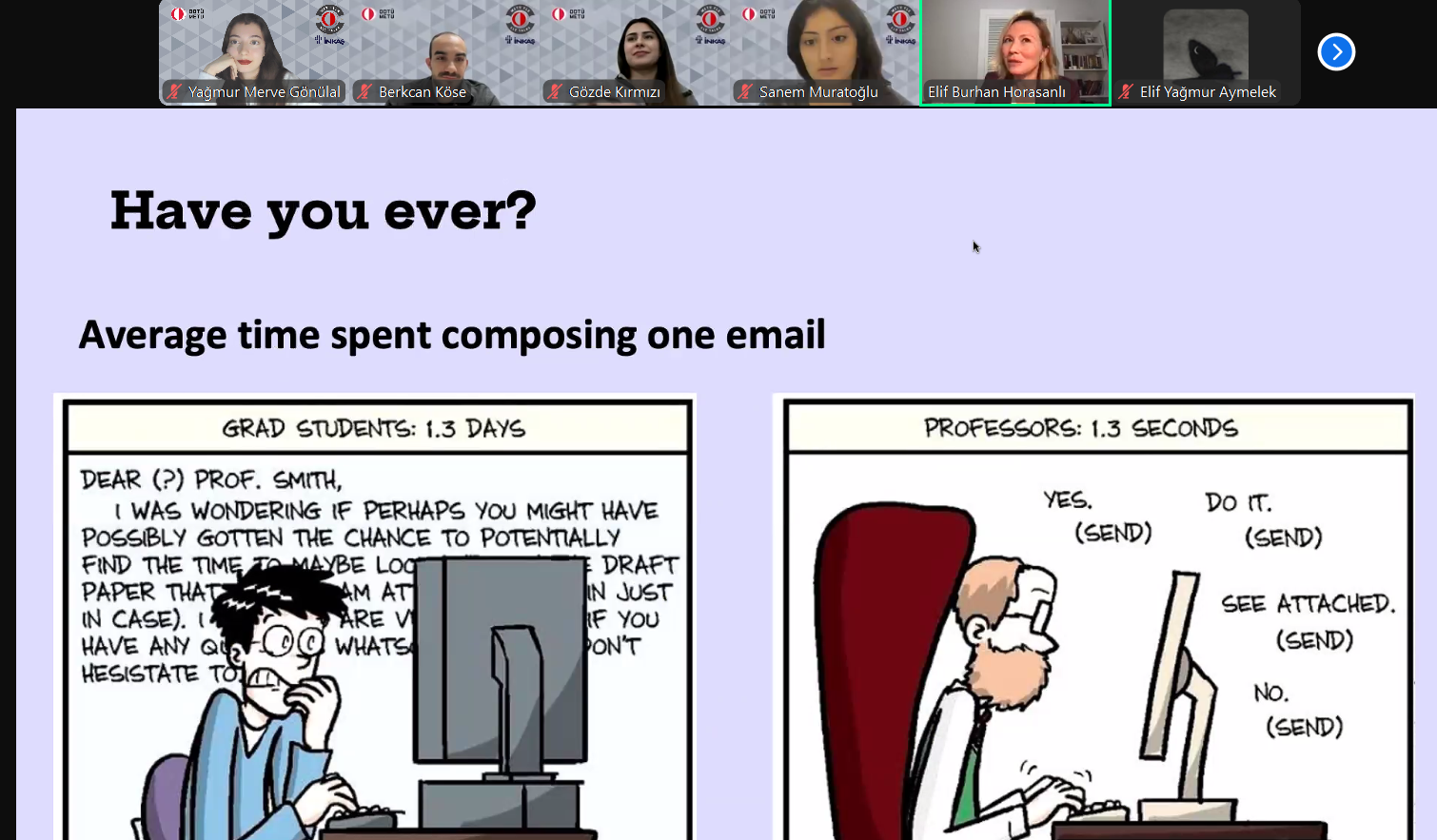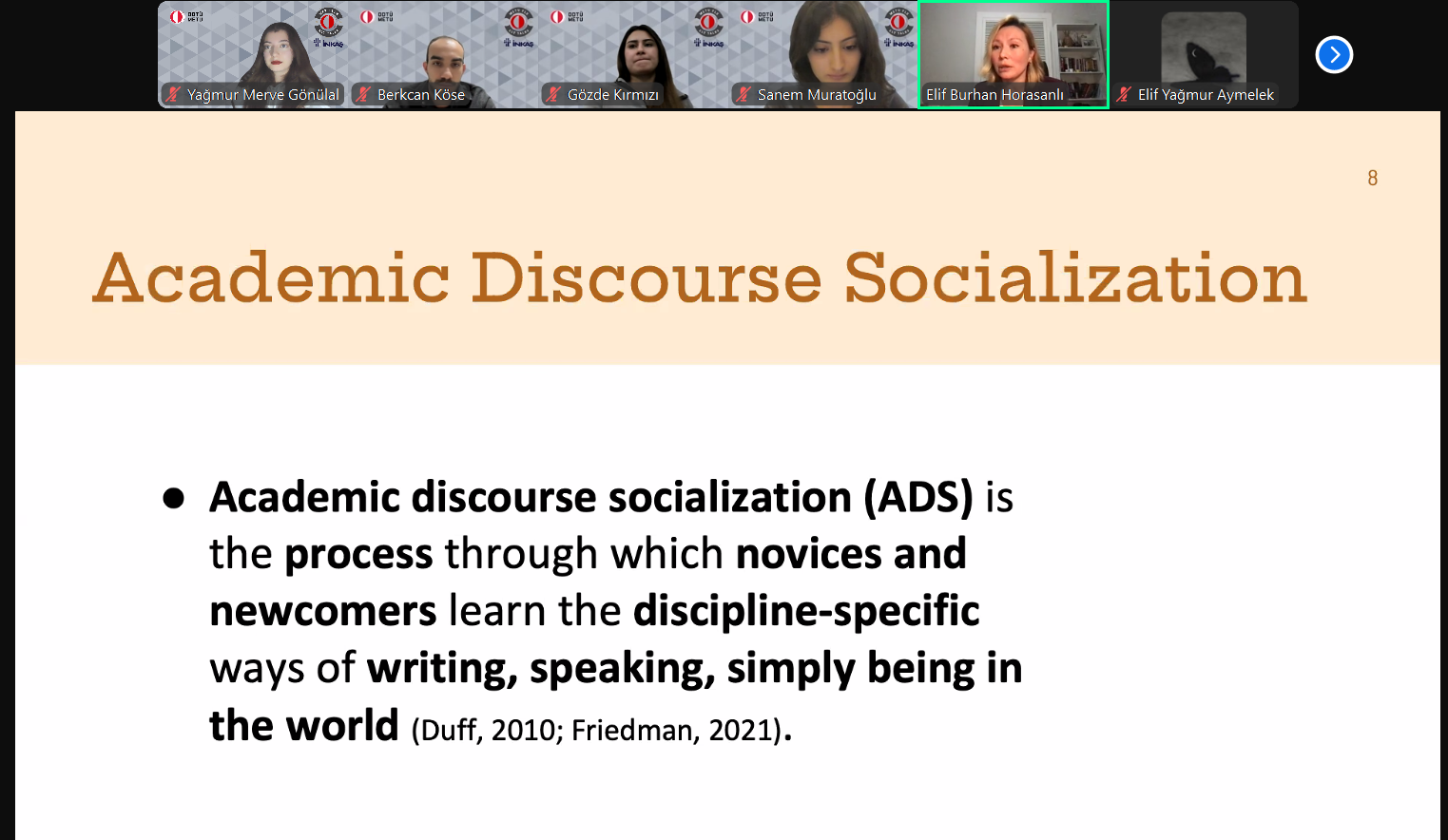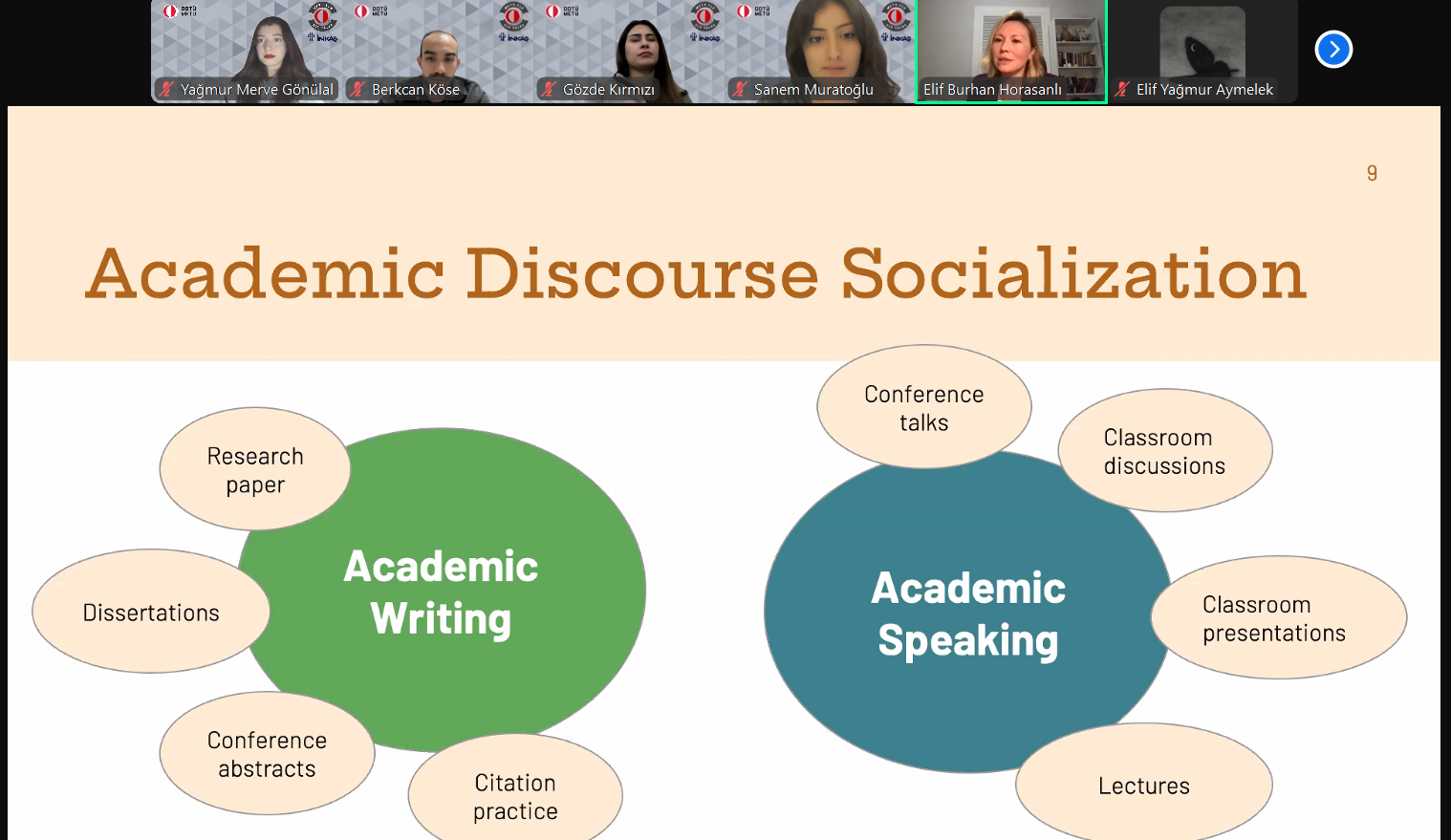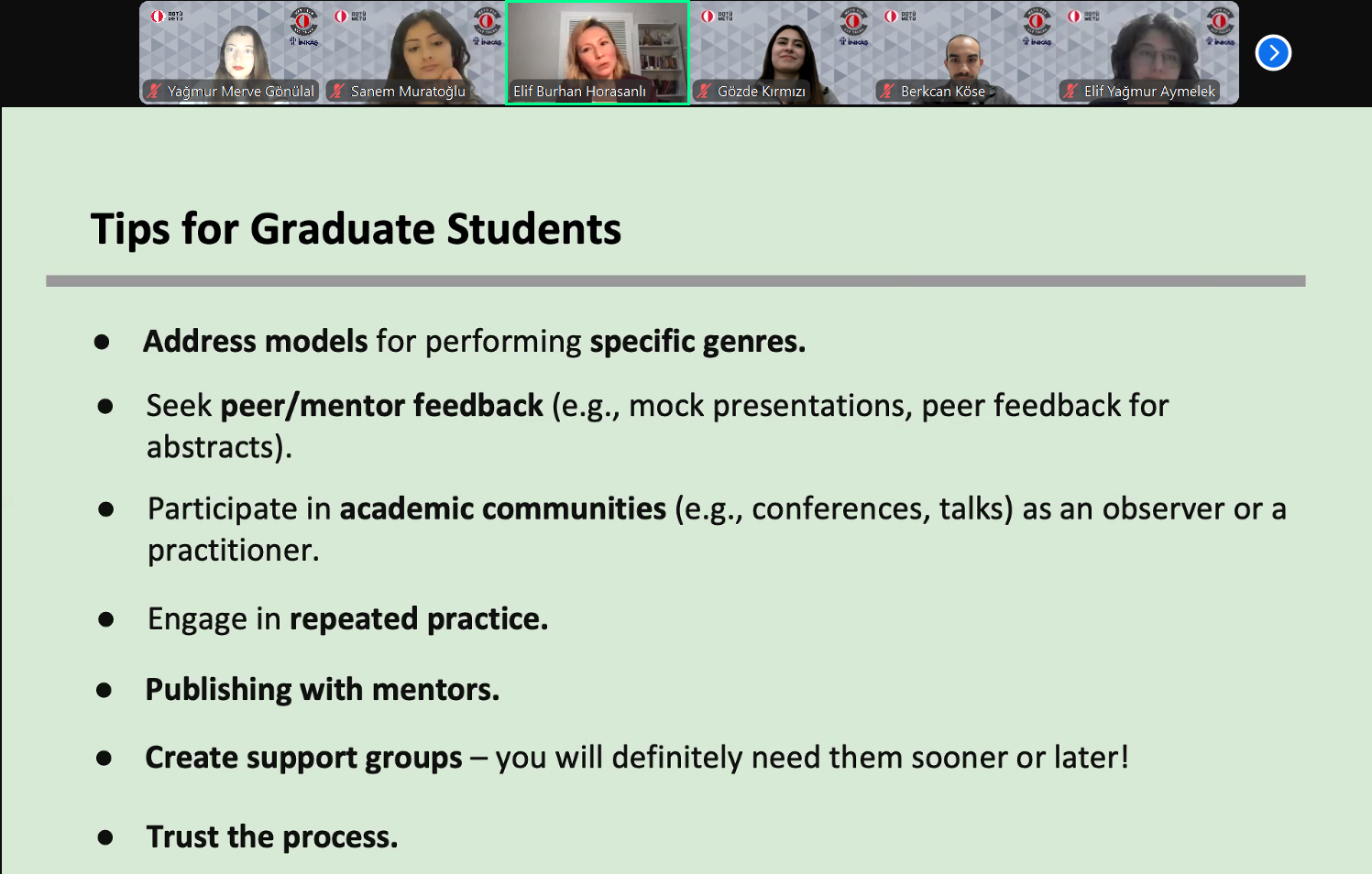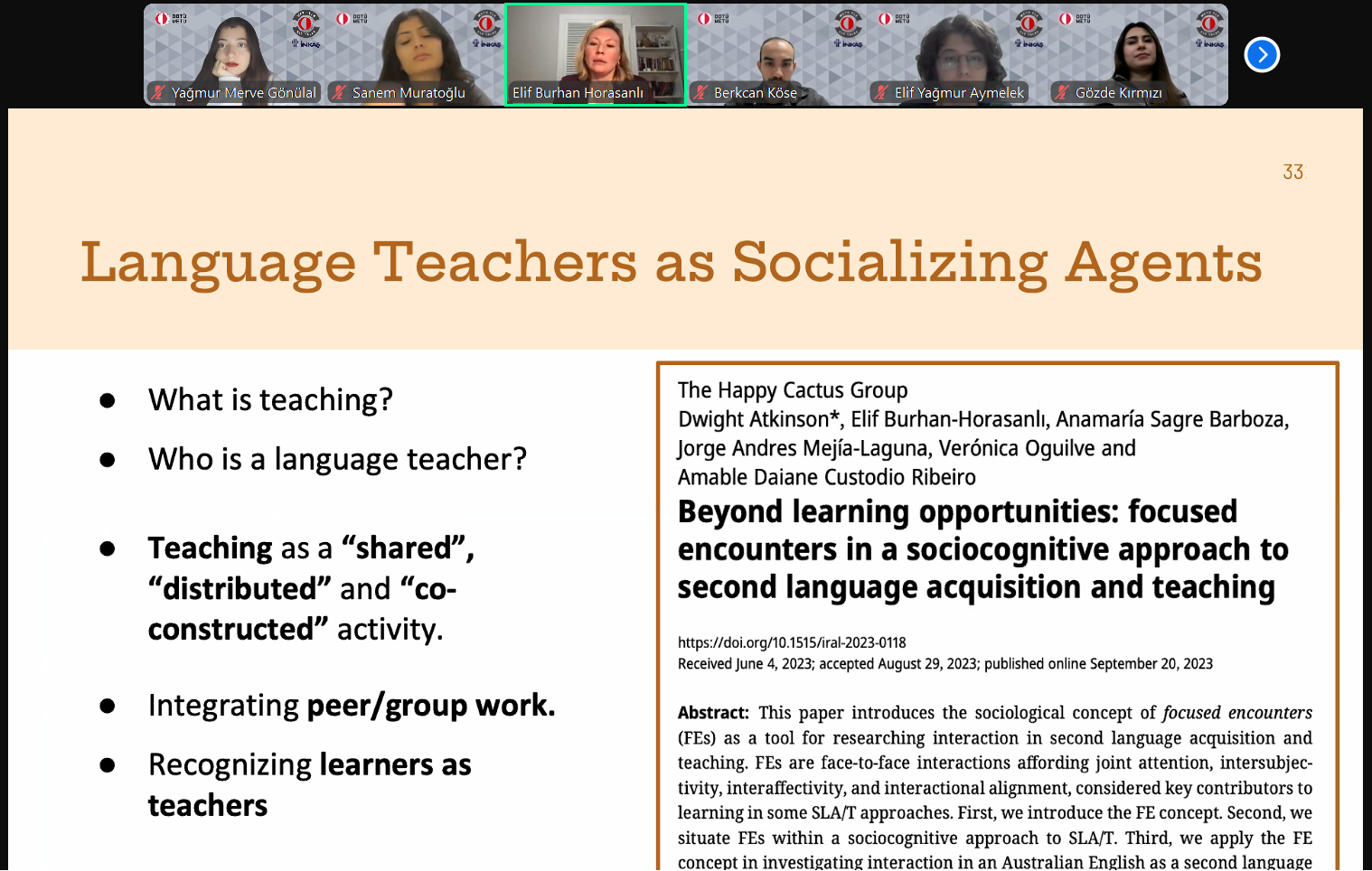METU FLE ELT Talks - Session 24 (Asst. Prof. Dr. Elif Burhan Horasanlı)
Session notes:
"Have you ever spent minutes and minutes before sending an email to a professor, reading your text over and over again to make sure you have no grammar mistakes and especially informality, only to receive a one-word answer back from them? There is a high chance that this situation is quite familiar to you. As graduate and even undergraduate students, we vividly feel this stress quite often in our education years, and this was also our thought-provoking introduction to Asst. Prof. Dr. Elif Burhan Horasanlı's insightful talk. She was our dear guest for the 24th session of METU FLE ELT Talks, and her focus mainly revolved around Academic Discourse Socialization, ADS for short.
"The world of academia is filled with Academic Discourse," said Burhan-Horasanlı and further invited us to the question, "But what is Academic Discourse?" To briefly define Academic Discourse, as Burhan-Horasanlı referred to a quote from Casanave, it is "a second language to learn for everyone that is full of necessary terminology, jargon, formal turns of phrases and unfamiliar research methods, theories, and philosophical stances." Burhan-Horasanlı also highlighted an important point here connected to the definition of Academic Discourse, mentioning that "If you are reading an article and if you fail to understand, do not feel bad, it is quite normal because academic discourse involves many complex elements and it is not particularly easy for newcomers to really grasp what these are."
This is when Academic Discourse Socialization (ADS) comes in handy: "It involves this process through how novices learn the discipline-specific ways of writing and speaking." So far, scholars have investigated academic writing and speaking through various aspects such as research papers, dissertations, conference abstracts as well as conference talks, classroom discussions, and presentations. They analyzed how students engage with these activities and what they understand from them. Therefore, ADS mainly focuses on understanding how people learn these practices through several social interactions such as teacher feedback, peer feedback, repeated practice, etc.
To delve into the world of ADS even more, we should closely examine its theoretical background. As Burhan-Horasanlı explained, ADS refers to Language Socialization Theory, which emerged as a response to understanding L1 acquisition. In contrast to the dominant cognitive approaches present during the 1960s and 70s, the underrepresentation of social interaction was brought up to the surface by many names, such as Dell Hymes, who proposed the ethnography of communication and underlined the significance of how context shapes how we learn and teach languages. With the start of this shift, more focus on social elements and different contexts started to be given. As Burhan-Horasanlı further refers to the initial majority of research being conducted in North American contexts, she introduced one of the leading research by Elinor Ochs and Bambi Schieffelin, resulting in the approval of different practices in different societies.
Language Socialisation theory was later adopted by Second Language Acquisition (SLA) scholars as they were trying to figure out how novice language learners socialise into a second language. They realised that their socialisation was quite different because, in their L1, they already had an understanding of their own culture and beliefs, whereas in L2, sometimes certain clashes took place. Socialisation in a second language differed from the L1 language because sometimes learners did not have enough motivation, investment, agency, etc. To summarise the theoretical foundation, ADS was influenced by L2 Socialization connected to SLA, which is rooted in Language Socialization Theory.
Burhan-Horasanlı mentioned four main principles of ADS: The influence of social and cultural practices, bidirectionality, situatedness, and multimodality. Let us delve a little more into each principle one by one.
To begin with the first principle, the influence of social and cultural backgrounds on ADS practices, Burhan-Horasanlı gave an excellent example for us as she said, "We as teachers believe that when a student does not want to participate in a class activity, we think that they are not interested in the content or they might not have enough language competence. But sometimes students do not participate because they are not used to it and do not have it in their first culture." She provided an on-point example mentioned in an article from 2009 by Naoko Morita about a Japanese student struggling to participate in academic discourse practices because of his cultural background.
As for the second principle of ADS, which is bi-directionality, Burhan-Horasanlı explained the principle through this explanation: "Technically, In Language Socialization Theory, newcomers are not seen as important socialising agents as they almost always socialise into some values and beliefs by expert people. However, ADS shows that novice people can actually serve as socialising agents and shift roles as well." Burhan-Horasanlı further gave us an example that students, when reading an article, collaboratively worked and used their previous cultural backgrounds, knowledge, and experiences. They mainly socialised with each other in academic terminology and academic conventions.
For the third principle, situatedness refers to ADS's context-bound and discipline-specific nature. "For example, if you are delivering a conference presentation, you usually have 20 minutes. However, when I did my dissertation study with an engineering research team, I realised that their presentation was only nine minutes. This timing gap is huge, and as you can guess, they will not be the same." Therefore, despite the common saying that it might be typical, it might not be so, ultimately altering your ADS usage as well. And finally, the fourth principle focuses on the multimodality of ADS. According to Burhan-Horasanlı, as academic interaction requires you to acquire ADS, you are not only learning the language but also exposed to many literacies. This is why ADS is beyond linguistics competence.
What are some potential tips and suggestions for improving ourselves for our ADS journey? Burhan-Horasanlı also provided us with various ways to answer this question. Finding appropriate modals can be pretty helpful to be used as possible frameworks. "If you are going to prepare a lesson plan, find a similar one; it will help you." Another one would be feedback. Whether it be from peers or mentors, it is always valuable to gain an outside opinion for your presentations, or your papers can provide helpful insights. Participating in different academic communities can also be beneficial, further expanding your network to inspire and get inspired simultaneously. Engaging in repeated practice is also significant, as practice really makes it perfect! And finally, trusting the process, just like many other aspects, is essential.
What about language teachers? What practices can we have in our classrooms to further support our students' ADS journey? As Burhan-Horasanlı stated, "When you become a language teacher, you do not suddenly become one, but it takes time. So, socialisation into the profession, such as giving proper instructions, also takes some time." Similarly, processes such as lesson planning, adapting to institutional norms, and fully understanding assessment practices will take time. Creating the needed time for self-reflection regarding your beliefs and values here is crucial. In addition, you can always observe your process and organise support groups to be in touch with your fellows as they might be experiencing similar situations. Another essential point Burhan-Horasanlı underlined is that do not be afraid to ask for help. "As a socialising agent and teacher, be their role model and encourage them to participate and question so that you can raise strong individuals."
In a nutshell, we should remember that the difficulty of learning the academic language does not rely on its terminology but on its multiple and complex elements, including gestures, multimodality, and various literacies. But there is good news! When learning academic practices, you have different sources; the best are your friends! "Despite possibly undervaluing your efforts, you should always remember your contributions, no matter how small they are, always matter as they will enrich the ecology since they are unique to you." to conclude with a wonderful quote from Burhan-Horasanlı: "Language teachers are serving as socialising agents, and if you want to change things in a country, you should use teachers and their expertise."

